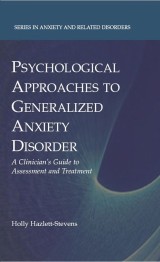Details

Psychological Approaches to Generalized Anxiety Disorder
A Clinician's Guide to Assessment and TreatmentSeries in Anxiety and Related Disorders
|
96,29 € |
|
| Verlag: | Springer |
| Format: | |
| Veröffentl.: | 10.12.2008 |
| ISBN/EAN: | 9780387768700 |
| Sprache: | englisch |
| Anzahl Seiten: | 190 |
Dieses eBook enthält ein Wasserzeichen.
Beschreibungen
<P>One of the hallmarks of generalized anxiety disorder, along with diffuse pathological worry and somatic complaints, is its resistance to therapy. Of available treatment modalities for GAD, cognitive-behavioral therapy garners the best empirical support in terms of successful long-term results. Psychological Approaches to Generalized Anxiety Disorder offers clinicians a wide variety of CBT strategies to help clients develop core anxiety-reduction skills, presented so that readers can hone their own clinical skills.</P>
<P>Concise without skimping on information, this book reviews current theory and research, addresses important diagnostic issues, and provides salient details in these key areas: Assessment procedures and treatment planning; Latest therapy outcome data, including findings on newer therapies; Specific CBT techniques, including cognitive strategies, psychoeducation, anxiety monitoring, relaxation exercises, and more; Dealing with noncompliance, client ambivalence, and other challenges to therapy; Special considerations for treating older adults with GAD; Relapse prevention, transition issues, and ending treatment.</P>
<P>Psychological Approaches to Generalized Anxiety Disorder has much information of interest to new and seasoned clinicians, clinical researchers, and academic psychologists. It is also an especially valuable reference for graduate students treating or studying the anxiety spectrum.</P>
<P>Concise without skimping on information, this book reviews current theory and research, addresses important diagnostic issues, and provides salient details in these key areas: Assessment procedures and treatment planning; Latest therapy outcome data, including findings on newer therapies; Specific CBT techniques, including cognitive strategies, psychoeducation, anxiety monitoring, relaxation exercises, and more; Dealing with noncompliance, client ambivalence, and other challenges to therapy; Special considerations for treating older adults with GAD; Relapse prevention, transition issues, and ending treatment.</P>
<P>Psychological Approaches to Generalized Anxiety Disorder has much information of interest to new and seasoned clinicians, clinical researchers, and academic psychologists. It is also an especially valuable reference for graduate students treating or studying the anxiety spectrum.</P>
Diagnosis, Clinical Features, and Theoretical Perspectives.- GAD Treatment Research.- Assessment Procedures and Treatment Planning.- Psychoeducation and Anxiety Monitoring.- Relaxation Strategies.- Cognitive Strategies.- Behavior Therapy and Exposure Strategies.- Common Problems and Clinical Considerations.
<P><STRONG>Holly Hazlett-Stevens, Ph.D.,</STRONG> is assistant professor of psychology at the University of Nevada, Reno. Since receiving her doctorate from Pennsylvania State University in 1999, she’s published many articles and taken part in numerous scientific presentations on anxiety and anxiety-related subjects. She recently served as research coordinator for a large, multi-site investigation of the identification and treatment of panic disorder in a primary care medical setting (administered by the UCLA Anxiety Disorders Behavioral Research Program). Her main research interests include: generalized anxiety disorder, normal and pathological worry, anxiety and stress-related disorders, psychotherapy outcome research, and fear reduction. </P>
<P>One of the hallmarks of generalized anxiety disorder, along with diffuse pathological worry and somatic complaints, is its resistance to therapy. Of available treatment modalities for GAD, cognitive-behavioral therapy garners the best empirical support in terms of successful long-term results. Psychological Approaches to Generalized Anxiety Disorder offers clinicians a wide variety of CBT strategies to help clients develop core anxiety-reduction skills, presented so that readers can hone their own clinical skills. Concise without skimping on information, this book reviews current theory and research, addresses important diagnostic issues, and provides salient details in these key areas:</P>
<P></P>
<UL>
<P>
<LI>Assessment procedures and treatment planning.</LI>
<P></P>
<P>
<LI>Latest therapy outcome data, including findings on newer therapies.</LI>
<P></P>
<P>
<LI>Specific CBT techniques, including cognitive strategies, psychoeducation, anxiety monitoring, relaxation exercises, and more.</LI>
<P></P>
<P>
<LI>Dealing with noncompliance, client ambivalence, and other challenges to therapy.</LI>
<P></P>
<P>
<LI>Special considerations for treating older adults with GAD.</LI>
<P></P>
<P>
<LI>Relapse prevention, transition issues, and ending treatment.</LI>
<P></P></UL>
<P></P>
<P>Psychological Approaches to Generalized Anxiety Disorder has much information of interest to new and seasoned clinicians, clinical researchers, and academic psychologists. It is also an especially valuable reference for graduate students treating or studying the anxiety spectrum.</P>
<P></P>
<UL>
<P>
<LI>Assessment procedures and treatment planning.</LI>
<P></P>
<P>
<LI>Latest therapy outcome data, including findings on newer therapies.</LI>
<P></P>
<P>
<LI>Specific CBT techniques, including cognitive strategies, psychoeducation, anxiety monitoring, relaxation exercises, and more.</LI>
<P></P>
<P>
<LI>Dealing with noncompliance, client ambivalence, and other challenges to therapy.</LI>
<P></P>
<P>
<LI>Special considerations for treating older adults with GAD.</LI>
<P></P>
<P>
<LI>Relapse prevention, transition issues, and ending treatment.</LI>
<P></P></UL>
<P></P>
<P>Psychological Approaches to Generalized Anxiety Disorder has much information of interest to new and seasoned clinicians, clinical researchers, and academic psychologists. It is also an especially valuable reference for graduate students treating or studying the anxiety spectrum.</P>
This volume covers both a broad overview of background research and prominent theories, as well as taking an in-depth look at specific cognitive behavioral techniques in enough detail for clinicians to incorporate these techniques into their practice. Includes supplementary material: sn.pub/extras


















